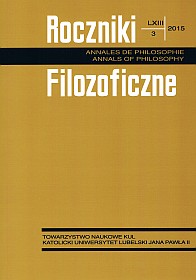Prussian Reproduction, Proper Function and Infertile Marriages
Abstract
Alex Pruss argues that romantic love is a basic form of human love that is properly fulfilled in sex oriented towards reproduction. As a result, homoerotic sexual activity cannot obtain the proper consummation and therefore involves misunderstanding the other person’s nature and the possibility of union with them. Although same-sex sexual activity may feel like a consummation of romantic love, it is wrong to generate such a false experience in oneself or another. Presented is an apparent dilemma for Pruss’s thesis suggesting that either both postmenopausal homosexuals and postmenopausal heterosexuals ought to be allowed to marry for their romantic love is not dysfunctional despite not being oriented towards reproduction, or that matrimony is inappropriate for both groups. I suggest avoiding the dilemma in either of two ways that would allow Pruss to distinguish the infertility of homosexual couples from the infertility of post-menopausal women.
References
Allen, Colin, March Berkoff, and George Lauder. 1998. Nature’s Purposes: Analyses of Functions and Design in Biology. MIT Press.
Antony, Louise. Kurtz Lecture “Materialism, Naturalism and Nihilism.” University at Buffalo, October 20, 2011
Boorse, Christopher. 1977. “Health as a Theoretical Concept.” Philosophy of Science 44:542–73.
Boorse, Christopher.1997. “A Rebuttal on Health.” In What Is Disease?, edited by James M. Humber and Robert F. Almeder, 1–134. Totowa, NJ: Humana Press.
Boorse, Christopher. 2002. “A Rebuttal on Functions.” In Functions: New Essays in the Philosophy of Psychology and Biology, edited by Andre Ariew, Robert Cummins, and Mark Perlman, 63–112. New York: Oxford University Press.
Caplan, Arthur L. 1992. “Is Aging a Disease?” In If I were a Rich Man could I Buy a Pancreas and Other Essays on the Ethics of Health Care, edited by Arthur L. Caplan, 195-209. Bloomington and Indianapolis: Indiana University Press.
Dawkins, Richard. 1976. The Selfish Gene. Oxford, New York: Oxford University Press.
George, Robert, Sherif Girgis and Ryan Anderson. 2010.“What is Marriage?” Harvard Journal of Law and Public Policy. Harvard Journal of Law and Public Policy, 34,1:245–87.
Hull, David. 1978. “A Matter of Individuality.” Philosophy of Science, 45:335–60.
Hershenov, Rose, and David Hershenov. 2015. “Morally Relevant Potential,” Journal of Medical Ethics. 41,3:268–71.
Plantinga, Alvin. 1993. Warrant and Proper Function. New York, Oxford: Oxford University Press.
Pruss, Alex. 2012. One Body: An Essay in Christian Ethics. Notre Dame: Notre Dame University Press.
Reznek, Lawrie. 1987. The Nature of Disease. London, New York: Routledge and Kegan.
Smith, Barry. 2014. “Ontology of Aging.” PANTC Conference, University at Buffalo. August 2, 2014 http://www.buffalo.edu/cas/philosophy/news-events/events.html
Van Inwagen, Peter. 1995. “The Place of Chance in a World Sustained by God.” In Peter Van Inwagen. God, Knowledge and Mystery. Ithaca: Cornell University Press.
Wakefield, Jerome. 1992. “The Concept of Mental Disorder: On the Boundary Between Biological Facts and Social Values.” American Psychologist 47,3:378–88.
Copyright (c) 2015 Roczniki Filozoficzne

This work is licensed under a Creative Commons Attribution-NonCommercial-NoDerivatives 4.0 International License.





